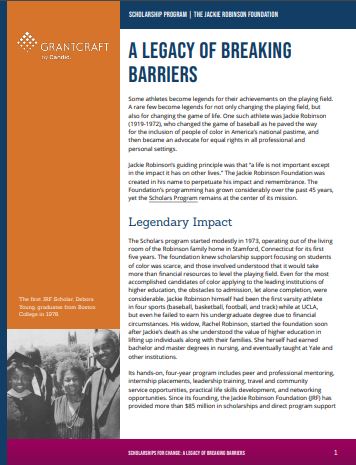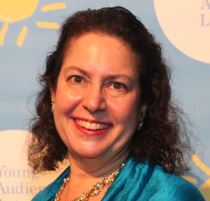A Legacy of Breaking Barriers
Some athletes become legends for their achievements on the playing field. A rare few become legends for not only changing the playing field, but also for changing the game of life. One such athlete was Jackie Robinson (1919-1972), who changed the game of baseball as he paved the way for the inclusion of people of color in America’s national pastime, and then became an advocate for equal rights in all professional and personal settings.
Jackie Robinson’s guiding principle was that “a life is not important except in the impact it has on other lives.” The Jackie Robinson Foundation was created in his name to perpetuate his impact and remembrance. The Foundation’s programming has grown considerably over the past 45 years, yet the Scholars Program remains at the center of its mission.
Legendary Impact
The Scholars program started modestly in 1973, operating out of the living room of the Robinson family home in Stamford, Connecticut for its first five years. The foundation knew scholarship support focusing on students of color was scarce, and those involved understood that it would take more than financial resources to level the playing field. Even for the most accomplished candidates of color applying to the leading institutions of higher education, the obstacles to admission, let alone completion, were considerable. Jackie Robinson himself had been the first varsity athlete in four sports (baseball, basketball, football, and track) while at UCLA, but even he failed to earn his undergraduate degree due to financial circumstances. His widow, Rachel Robinson, started the foundation soon after Jackie’s death as she understood the value of higher education in lifting up individuals along with their families. She herself had earned bachelor and master degrees in nursing, and eventually taught at Yale and other institutions.
 Its hands-on, four-year program includes peer and professional mentoring, internship placements, leadership training, travel and community service opportunities, practical life skills development, and networking opportunities. Since its founding, the Jackie Robinson Foundation (JRF) has provided more than $85 million in scholarships and direct program support to over 1,500 students of color, representing 45 states and the District of Columbia. These JRF Scholars have attended 260 colleges and universities and have achieved a nearly 100 percent graduation rate—more than double the national average for African-American college students. About twenty selective higher education institutions have served as key program partners, including Cornell, Harvard, Spelman, UCLA, University of Michigan, and University of Minnesota.
Its hands-on, four-year program includes peer and professional mentoring, internship placements, leadership training, travel and community service opportunities, practical life skills development, and networking opportunities. Since its founding, the Jackie Robinson Foundation (JRF) has provided more than $85 million in scholarships and direct program support to over 1,500 students of color, representing 45 states and the District of Columbia. These JRF Scholars have attended 260 colleges and universities and have achieved a nearly 100 percent graduation rate—more than double the national average for African-American college students. About twenty selective higher education institutions have served as key program partners, including Cornell, Harvard, Spelman, UCLA, University of Michigan, and University of Minnesota.
Seventy-five corporations, foundations, and individuals sponsor the annual group of 242 JRF Scholars in keeping with Robinson’s Brooklyn Dodger uniform number “42”. These sponsors range from corporate entities associated with Major League Baseball, such as New Era and Nike, to funders of college success, such as the Strada Education Network, to private foundations and other Fortune 500 corporations, many of which commit to multi-year funding.
An Evolving Effort
While the JRF Scholars program has remained at a relatively small scale in comparison to other national scholarship programs, the design features of the program center around long-term commitment. Each JRF Scholar receives a total four-year commitment of $30,000 in financial assistance so they are not left to wonder what would happen to them after freshman year. This core financial support is then reinforced by JRF’s year-round Mentoring and Leadership Development Program, a sophisticated, research-based approach to nurturing the essentials skills for success in college, work, and life.
JRF’s four-year mentoring curriculum is delivered by JRF professional staff, JRF Scholar Advisory Committees (a volunteer corps of 90 professionals across the country organized into nine regional committees consisting of approximately 10 members each), JRF Scholar alumni, and various program partners. By tracking each JRF Scholar’s college career in a personal file maintained over four-years, the JRF Mentoring and Leadership Development program is able to customize services to meet the needs of individual scholars. Over the past 45 years, the opportunities and services have been adapted and refined to meet the diverse needs of these students.
The components experienced throughout the Scholar’s college journey include:
- A four-day mentoring, learning, and life skills conference held each spring in New York City prior to the JRF’s annual black-tie fundraising gala. The conference features the JRF 42 Strategies for Success curriculum that is organized around seven key areas: academic excellence; leadership, service and civic engagement; health and wellness; personal and character development; financial empowerment; and career and professional development;
- Internships and employment opportunities;
- Career and mentoring services delivered in-person and online;
- Engaged year-round adult and peer mentors;
- A three-day New Scholar Orientation conference;
- Community service requirement and facilitation.
Measurable and Visible Impact
The JRF Scholars program has benefited from careful monitoring of student progress, refinement of its model, and a willingness to adapt its model based on changing student needs. As JRF president and CEO Della Britton noted, a wide range of challenges can interrupt or end the journey to a college degree for even the most committed Scholar; for these students, “life often happens more harshly.” By providing ongoing and comprehensive support, the JRF enables nearly all Scholars to more than survive the rigors of elite academic environments—they thrive and contribute to the success of others on campus.
Attentive tracking of individual student progress—and the ability to intervene—generates a powerful evidence base for the foundation. Based on the past 10 years of data, statistics that demonstrate the impact of the JRF Scholars program include:
- 98 percent graduation rate, compared with an overall 41 percent rate for African-Americans;
- 62 percent graduate degrees attained, compared with an overall 8 percent rate for African-Americans;
- 63 percent participation in community service, compared with an overall 19 percent rate for African-Americans;
- 84 percent participated in a campus club or organization, and 67 percent held a leadership role.
Originally established in order to increase access to higher education, The College Board, a strategic partner of the foundation, is now placing a greater emphasis on student inclusion and success and is looking to the JRF Scholars program for guidance to inform its own new scholarship program.
In considering the added value of the JRF Scholars program for these high-achieving students of color, Britton categorizes the different degrees of support received by students. For about half of the students, the JRF Scholars program enables them to feel fully supported and obtain strategies and opportunities to excel beyond what ordinary institutional aid would provide to students with high financial need. For approximately a quarter of students, the JRF Scholars program serves as insurance against drop-out; in other words, these students will attain degree completion despite confronting obstacles, benefitting from JRF’s early identification of and response to such obstacles. For the most academically-prepared students, the JRF program provides networking opportunities, career guidance and practical skills that allow them to both “self-actualize careerwise” and better navigate environments that can be intimidating or perceived as unwelcoming. According to Britton, “Black students too often do not reach out to professors and internship supervisors to ask for help. They don’t go to office hours; they don’t want to reveal any weakness. But the JRF Scholars know they can come to us with any problem.”
Scholars Stories
Grateful for the impact of the program on their careers and lives, past JRF Scholars from more than four decades are now active as alumni and serve as role models for the next generation of Scholars.
As a committed and engaged network, both the JRF Scholars and alumni are a growing resource for the program. JRF board chair Gregg Gonsalves, class of 1989, graduated with a degree in mechanical engineering from Columbia University; after working at Mobil Oil, he earned an MBA from Harvard, and eventually became a Goldman Sachs partner.
Victoria Lamothe ’21, a current JRF Scholar at the University of North Carolina, Chapel Hill, has described her own experience as lifechanging: “Thanks to JRF, I have been given so many opportunities that I never imagined I would have; I feel so blessed. I have been able to travel abroad for the first time to Tanzania, receive the opportunity to intern for AT&T, and build connections with successful mentors. Additionally, JRF has given me a second family that supports and cares for me. I am truly grateful to be a part of this organization.”
Expanding Impact
The JRF has added complementary programs in recent years to further enhance opportunities for its Scholars. Starting in 2006, JRF began the “Extra Innings” Fellowship to provide fellowship support for Scholars pursuing graduate studies. To date, nearly $1.6 million in “Extra Innings” support has been awarded to 95 JRF Scholars.
 In 2007, JRF established the Rachel Robinson International Fellowship Program (RRIF) to promote and fund international service and study opportunities for JRF Scholars, with the help of a matching gift that established an endowment for the program. Once selected, every JRF Scholar is assisted in obtaining a U.S. passport to encourage students to think about traveling abroad during their college careers. Since 2007, 136 JRF Scholars have traveled to 40 countries, and, beginning in 2017, the entire rising sophomore class of JRF Scholars travel together to Tanzania for a two-week service trip.
In 2007, JRF established the Rachel Robinson International Fellowship Program (RRIF) to promote and fund international service and study opportunities for JRF Scholars, with the help of a matching gift that established an endowment for the program. Once selected, every JRF Scholar is assisted in obtaining a U.S. passport to encourage students to think about traveling abroad during their college careers. Since 2007, 136 JRF Scholars have traveled to 40 countries, and, beginning in 2017, the entire rising sophomore class of JRF Scholars travel together to Tanzania for a two-week service trip.
The JRF Impact scaling initiative is the foundation’s ambitious effort to expand the impact of the JRF Scholars program beyond their annual cohort of 242.This new venture, now in the testing phase, aims to bring key elements of the Mentoring and Leadership Development Program and its “42 Strategies for Success” curriculum to tens of thousands of college students of color through a dynamic online platform, a set of institutional and organizational partners, and a network of participants.
During a three-year development period (2017–2019), JRF will pilot the JRF Impact offerings with cohorts of Scholars, applicants not selected as Scholars, and students reached through university partnerships. A research agenda is also envisioned, utilizing the program’s activity data to better understand patterns of minority student success. Through this scaling initiative, JRF expects that they will be able to dramatically increase the number of African-American college students who:
- Attain a bachelor’s degree
- Graduate from college with a full-time job or admission to a graduate school program
- Align their skills and interests with career selections
- Benefit from JRF’s on-line job portal developed with corporate sponsors and other partners
- Grow professionally and personally through JRF’s mentoring curriculum.
The Legacy
The JRF is guided by five core values embodied in the life of Jackie Robinson: integrity, discipline, courage, compassion, and humility. He was a trail-blazer as an athlete, businessman, and humanitarian. Thanks to the steadfast support of his family and admirers, Jackie Robinson is remembered not only for what he accomplished in his lifetime, but also in what he still inspires in the lives of so many others. As JRF president Britton heard from a recent Scholar, they “are part of an amazing continuum.”
For more on the Jackie Robinson Foundation visit jackierobinson.org.
This case study is one of 12 in a suite of case studies focused on how donors are supporting scholarships to create change. The case studies have been developed in companionship with Candid’s project Scholarships for Change, a dynamic hub that pulls together data and knowledge to tell the story of how philanthropic dollars are supporting transformative scholarships.





